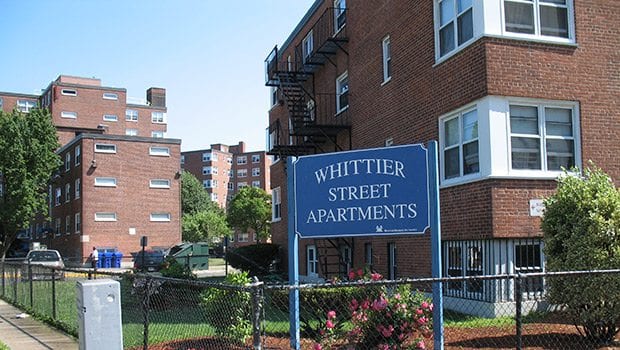BHA officials, community members meet to discuss $300 million redevelopment plan for Whittier Street public housing development

Representatives from the Boston Housing Authority, the U.S. Department of Housing and Urban Development, elected officials and other community members held forums and toured the neighborhood Saturday as they discussed the next steps in the $339 million development of the Whittier Neighborhood Transformation Plan.
The project would reshape the landscape of the area, creating new housing units, commercial development, health and human services.
The Boston Housing Authority released a draft of the Whittier Neighborhood Transformation Plan, a HUD-funded project that would rebuild the current 200 affordable housing units and add 353 units of mixed-use housing in the one-square-mile neighborhood flanked by Tremont Street, Melnea Cass Boulevard and Hampton Street. The development now has an estimated 9,300 residents in less than 4,000 units.
Seventy-five percent of the residents receive housing or other public subsidies and 47 percent are below the federal poverty level. Fifty-nine percent of the Whittier neighborhood residents are black or African American and 34 percent Hispanic or Latino. The majority of the housing is low-income with an unemployment rate of 19 percent, almost double the citywide rate.
City officials said that the 61-year-old Whittier Street Apartments are due for replacement. The rehabilitation would cost an estimated $40 million. Boston received a 2012 Choice Neighborhood Planning Grant from the U.S. Department of Housing and Urban Development to tear down the old housing and change the map near Ruggles Station.
According to a BHA press pamphlet called Whittier Choice, the neighborhood stands to gain an estimated $2 billion in investments over the next decade. The program has reached a tentative agreement with HUD, The Boston Foundation, Northeastern University, Wentworth, Roxbury Community College, The Whittier Street Health Center, Dudley Street Neighborhood Initiative, the American City Coalition and the City of Boston.
Boston City Councilor Tito Jackson said that finding temporary housing for the tenants of the demolished buildings is a major priority that is in the works heading towards the finalized plan coming this October.
Residents of the neighborhood voiced concerns about parking, crime, poor street lighting, a lack of police presence, crime and the fear of being squeezed out.
While walking on a tour of perimeter of the neighborhood, Linda Thomas, a 36-year resident, described finding a wounded person who had been mugged and stabbed outside of her building this passed September.
“These streets aren’t lit at night,” Thomas said. “That kid was lucky my neighbors found him. I came home and saw him with a towel on his head, nursing a knife wound. He’d just been beaten, stabbed and mugged.”
Thomas went on to say that drug-related issues are one of the biggest concerns she and other residents have when discussing the Whittier neighborhood issues.
“The residents of this neighborhood are honest and hardworking people, but it’s a laid back climate and people come in here to cause trouble,” she said.
While touring the neighborhood, one resident pointed out a building on Ruggles Street where gangs allegedly ran criminal activities. Another resident pointed out a patch of overgrown bushes near Madison Park where drug users went to shoot up. Both the building and the bushes are located in the shadow of the Boston Police Department headquarters at 1 Schroeder Plaza.
When asked about the poorly-lit corner of Cabot and Ruggles streets, residents replied, “I don’t know what activity goes on on this street. I never walk down it at night. Ever. The streetlights are never on. It isn’t safe.”
Resident Lorena Backas and Thomas both said that they shared optimism for the future of the Whittier Street redevelopment program. Members of the BRA handed out cards for residents’ comments and concerns, which needed to be submitted by August in order for the city to address them.
“We are in a planning process in order to submit our final plan to HUD in October,” Kate Bennett, Deputy Administrator from Planning and Sustainability at BHA said. “ They will send us a notice of funding for implementation funding in the fall or early 2015. Our plans will move forward after that.”
Bennett said that the BHA is competing with other HUD-assisted property owners for the application for grants. “Under the Choice program, these grants are wide open to HUD distressed property owners,” she said.
Bennett said that there are no more community meetings planned at the moment, but residents can expect more in the near future.
“I want to make sure that it’s clear that folks that need to be relocated have the right to come back to this neighborhood,” Bennett said. “Whether or not they do, they will be given temporary housing no matter what. They’ll have a guaranteed unit during and after the reconstruction. That’s the biggest source of people’s anxiety. But they will not be squeezed out or left behind.”






